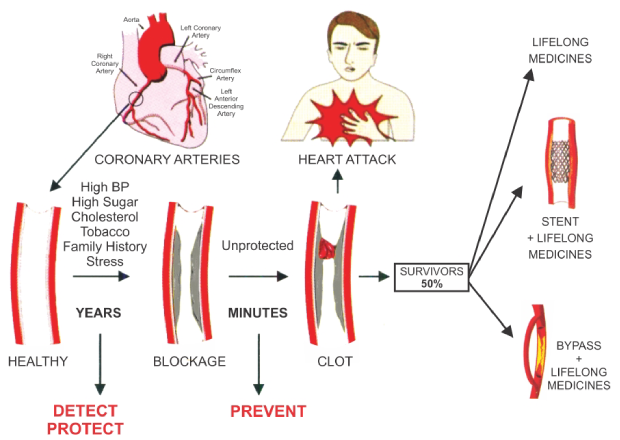Preventive Cardiology
Preventive Cardiology – the emerging discipline in Cardiology

Why is it important to prevent Heart Attack?
For 50% of the people with heart disease, heart attack is the first symptom. It is definitely not the best way to find out ! Unfortunately, 30%- 50% of these people do not survive the heart attack.
Hence, in order to prevent the deaths due to sudden heart attacks, early detection and control is necessary
Know how a Heart Attack occurs
The heart muscle requires a constant supply of oxygen-rich blood to nourish it. The coronary arteries provide the heart with this critical blood supply. If you have Coronary Artery Disease arteries become narrow and blood cannot flow as well as it should. Fatty matter, calcium, proteins and inflammatory cells build up within the arteries to form plaques of different sizes. The plaque deposits are hard on the outside and soft and vulnerable on the inside.
When the plaque’s hard layer ruptures, some blood cells come to the area and form blood clots around the plaque. If a blood clot totally blocks the artery, the heart muscle becomes “starved” for oxygen. Within a short time, death of heart muscle cells occurs, causing permanent damage. This is called a myocardial infarction (MI) or heart attack.
A heart attack can also be caused by a spasm of a coronary artery. During coronary spasm, the coronary arteries restrict or spasm on and off, reducing blood supply to the heart muscle (ischemia). It may occur at rest and can even occur in people without significant Heart Disease
We specialize in managing adults who are concerned about their hearts, whether they already have symptoms of heart disease or they want to prevent future cardiac events. We deal with prevention at three levels.
Primary prevention is aimed at the prevention of heart disease before an event such as heart attack, stroke or need for cardiovascular surgery occurs.
Secondary prevention is aimed at early detection of Coronary Artery Disease and institute aggressive risk factor control and medication, if necessary.
Tertiary prevention works for an individual after they have experienced an event such as heart or vascular surgery, angioplasty or heart attack, to prevent further progression of cardiovascular disease.
Safe Health’s personalized comprehensive approach to lifestyle and medical management can slow progression of cardiovascular disease and decrease one’s future risk of heart attack, stroke, Angioplasty or By pass surgery.
What makes Safe Health’s Preventive Cardiology Program unique?
-
An integrated approach to the aggressive control of all risk factors with a special emphasis on cholesterol diabetes and blood pressure management
-
Individualized nutrition assessment, education and support services
-
Assessment of cardiovascular risk factors
-
Intensive counseling and education to promote a heart-healthy lifestyle
-
Assessment of various Cardiovascular Functions
-
Medical Management of Heart Disease using Optimal Pharmotherapy.
-
Prevention of Heart attack, Stroke, Heart Failure
How does Safe Health’s Preventive Cardiac program work with your Doctor?
The Preventive Cardiology specialists will complete a comprehensive evaluation and create an individualized treatment plan. They work closely with each patient and their family physician or cardiologist to design a program that fits with their overall health profile.

